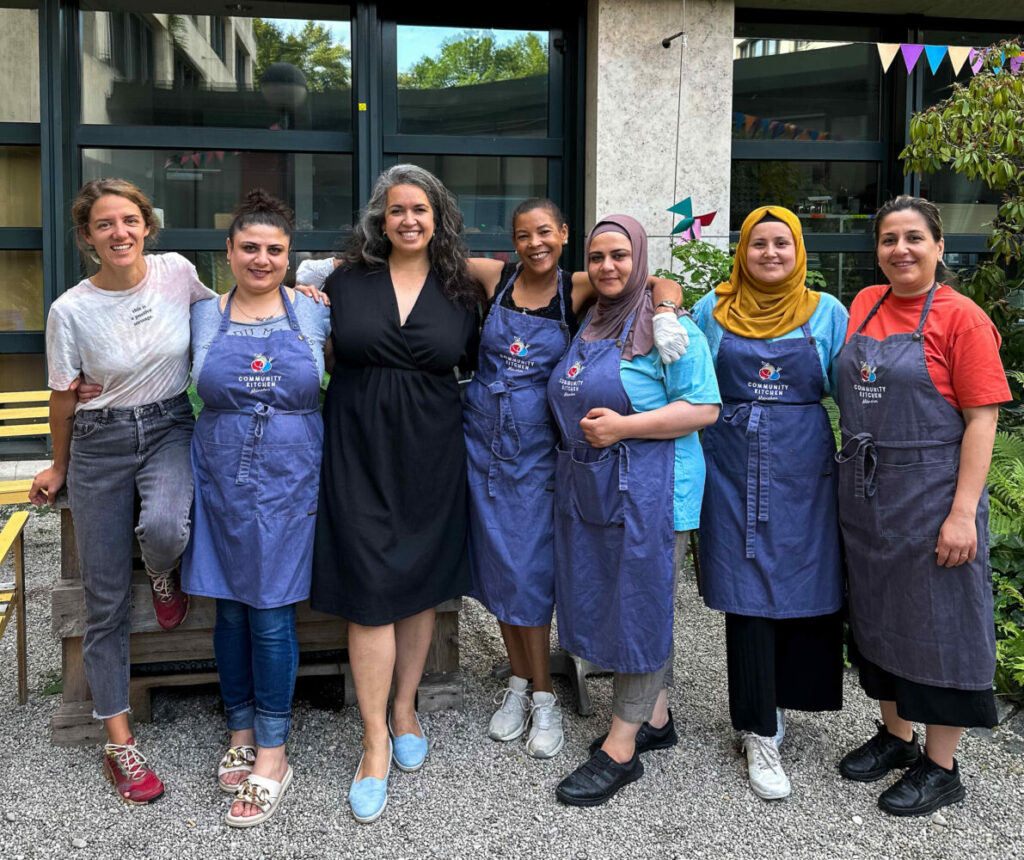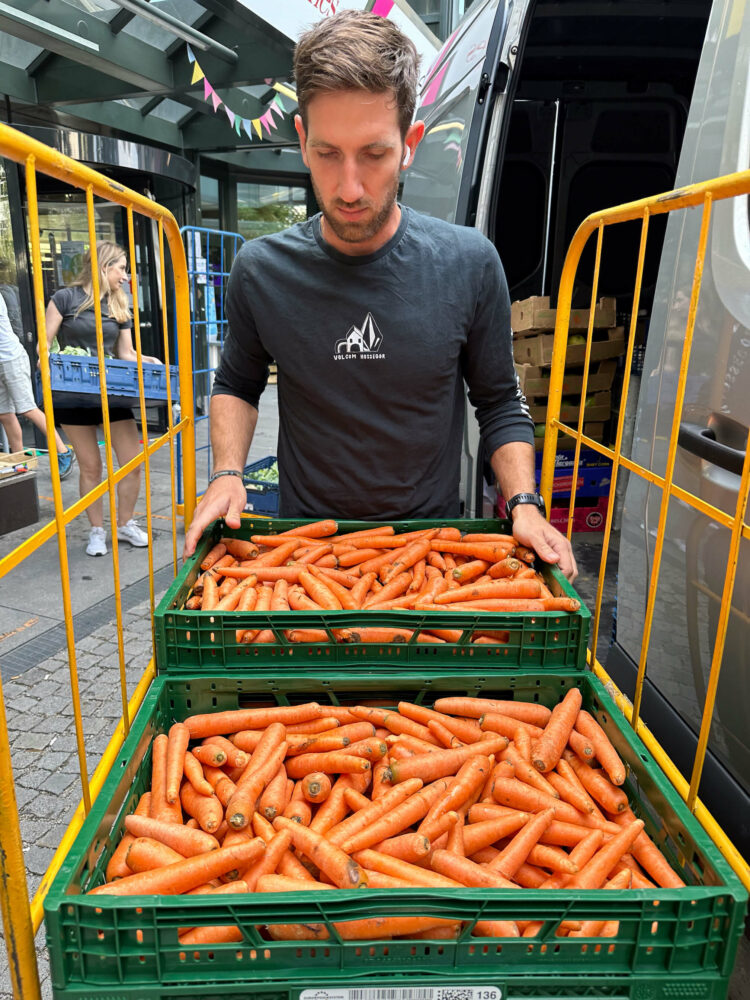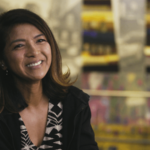
MUNICH, GERMANY—When Günes Seyfarth learns that the rescue van is out front, it’s an all-hands-on-deck operation. This new batch of produce – all of it reclaimed – will determine what is on the lunch menu in just four hours.
Seyfarth strides out of the kitchen, her team swelling in size as she moves from the restaurant and through the building’s lobby. She swings the car’s sliding doors open, greeting three employees inside.
“It was your first rescue,” she says to the new employee.
It’s apparent that this is a coveted rite of passage for those eager to join her battle against food waste.
“How was it?”
He smiles, letting the over 20 crates of carrots, cauliflower and mushrooms speak for themselves. The team has gathered the crisp produce from local German farms and wholesalers entirely for free, as it would otherwise be thrown away.
The team loads the crates onto wagons and heads for the kitchen. Seyfarth and her co-founder, Judith Stiegelmayr, begin brainstorming the day’s meals on the way, slightly puzzled by how to best cook the cauliflower. But the team rescues 40 tons of food per week. No ingredient will stump their creativity.
Seyfarth, Stiegelmayr and Natalie Gath are the forces behind Community Kitchen München, a restaurant in the Neuperlach district of Munich that is entirely powered by food waste. Their operation sells lunch for €6.80, with the production cost totaling about 10% of the sales price. The restaurant’s store also sells other products made from food waste, including sauces and jams that range from €3.50 to €5.00.
The team is driven by statistics that show that globally, eliminating food waste could reduce up to 8% of human-generated greenhouse gas emissions. In the European Union alone, €132 billion worth of food, equating to 59 million tons, becomes waste each year. Annually in the U.S., food waste amounts to 133 billion pounds, or $161 billion.
Community Kitchen München operates on the first floor of a 40,000-square-meter office building owned by the American-based real estate firm, Hines. When previous tenants vacated in 2020, Hines launched an experiment, requesting proposals from groups who would rent the space in an interim period before the property is ultimately torn down and redeveloped.
Seyfarth and her team won the bid, and in June 2022, they began renting the space at a discounted rate and built a cultural and business center for startups, musicians and artists. In February 2022, they opened Community Kitchen München in the skeleton of the previous corporate cafeteria. Their contract allows them to remain in the location until the end of 2024, after which they’ll look for a similar unused kitchen space.
Plants now grow out of the escalators that once ferried employees down for their cafeteria lunches. New tenants have turned private offices into movie rooms, sewing centers and zero-waste art galleries. In the lobby waiting area, members of the Knitting Grandmas Group gather with their yarns while alongside them, startup founders welcome visitors for business meetings.
Back in the kitchen, Seyfarth pulls back her jacket sleeve to explain where the Community Kitchen München team sources its food waste.
“Here,” she says, pointing to the top of her bicep, “are the farms.”
She then traces an imaginary line — the food supply chain — down her arm: manufacturers, wholesalers, supermarkets and restaurants. By the time she reaches her wrist, she says, “Households.” Some 17% of global food production is wasted along the way, according to the United Nations.
Seyfarth shares that from her perspective in Germany, food sellers compete in a saturated arena for market share, often overstocking or over-ordering the amount of product they actually need. Community Kitchen München rescues the excess edible produce from manufacturers, wholesalers and farms.
While free produce may seem too good to be true, producers in Germany have to pay varying fees to remove and throw away food. One Community Kitchen München partner pays €65 to throw away one pallet of food. Seyfarth and her team have built relationships with producers and wholesalers organically, going in person to meet them and offer their removal – and reuse – services.

Seyfarth has also made it core to the company’s operations to employ diverse workers, including immigrants in the community. With green entrepreneurship and so-called upskilling on the rise, many of Community Kitchen München’s 25 employees and over 120 volunteers share a collective joy for building a solution in the climate crisis.
“For me, I like working here,” says Ana, a kitchen employee from the Dominican Republic shared in Spanish. “My team is beautiful.”
Community Kitchen München also prioritizes education. Every week, over 200 schoolchildren visit the restaurant on field trips. The kitchen staff teaches them about food waste and climate change, and then they cook their own lunch to form an early positive association with using food in its entirety.
Professionals outside of Germany are taking note of Community Kitchen München’s work. In May, primatologist and conservationist Jane Goodall visited in person.
“‘Educate the kids,'” Seyfarth remembers Goodall saying. “‘Let them educate their parents.'”
The external validation has reinforced Seyfarth’s aspirations to scale the operation. She views the food-waste model that the team has implemented and tested in Munich as a potential franchise, which eco-entrepreneurs could then deploy in other cities around the world. Seyfrath points to Sweden-based Spill as another food-waste restaurant model.
At lunchtime, the Community Kitchen München team begins serving its repurposed food waste, culminating in a lunch of seasoned cauliflower steak, mashed potatoes and coriander.
Down the street, there’s plenty of competition, including a mega shopping mall with a traditional food court that’s packed at lunch hour. But Community Kitchen München’s ingredients have attracted local workers on their lunch breaks, professionals conducting meetings over a meal, and families visiting Munich. The guests crowd the inside and outside seating areas, eating at mismatched tables and chairs – “rescued” furniture. Every item and food calls the consumer’s attention.
“The more disconnected we are from how our food is produced,” said Seyfarth, “the more we throw away.” ◼



